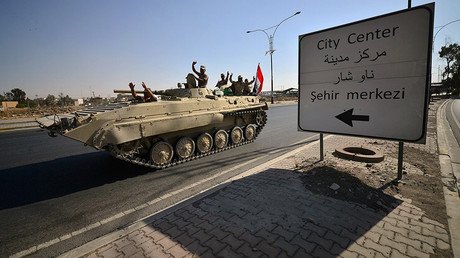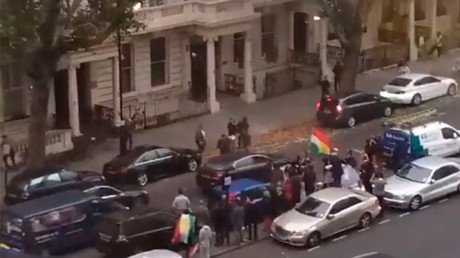Dramatic moment Iraqi forces enter Kurdish Kirkuk, captured by RT (VIDEO)
An RT Arabic crew has been on the frontline in Kirkuk and managed to film dramatic scenes showing the very moments the Iraqi military forced its way into the Kurdish-controlled city Monday.
The exclusive footage brought by RT Arabic correspondent Bzurk Muhammad shows tanks and armored personnel carriers roaming the empty Kirkuk roads while brandishing red, black and green Iraqi flags. As they stream deeper into the city, thick white smoke starts filling the air. Men armed with rifles can be seen firing shots in the direction of the procession from a sidewalk, sparking panic among the onlookers.
As the Iraqi forces were preparing to take over, many of the locals opted to flee Kirkuk as it turned into a battle zone.
“Half the Kirkuk residents have left the city, worried because of the confrontation between the Iraqi Army and the Kurdish forces. The residents are fleeing into Kurdistan’s other provinces and demanding the war and hostilities in Kirkuk be stopped,” Peshtivan Ahmad, a local resident, told RT.
With Kirkuk split between a Kurdish, Arab and Turkmen population, there were those who rejoiced at the sight of the Iraqi Army taking control over the city.
“Where are Asayish [Kurdish intelligence agency] and Peshmerga?! They have abandoned the city. We are calling on the Iraqi government to hold corrupt officials and crooks who squandered Kirkuk’s budget accountable,” Sheikh Emad Fili, a local resident, told RT.
The lack of concerted response to the Iraqi forces’ invasion from the Kurdish militias highlighted the discord between different Kurdish factions, as some of the militias were reported to leave Kirkuk and others stayed to face off with the Iraqi forces.
Iraqi Army soldier Ahmad Hussaine told Muhammad that the troops have been on a hunt for Peshmerga fighters who might be still holing up in the city.
“Thank God, our combat spirit is very high,” Hussaine said, adding that the Iraqi forces have been combing the terrain in search for Kurdish fighters since Sunday.
“Some eight Peshmerga fighters were killed at the beginning. And since then we haven’t found anyone,” he said, noting that although there have been other instances of clashes with Peshmerga, they have not resulted in casualties.
“They tried to resist. They opened fire at us, but no one was hurt.”
Residents of Kirkuk, which borders Iraq’s Kurdistan Region, took part in a recent Kurdish independence referendum. The vote was denounced by Iraq and neighboring countries with large Kurdish populations, as well as by the international community.
While the ballot could have been the last straw, that prompted the Iraqi government to “enforce security” on the city, its timing shows that the retreat of Islamic State (IS, formerly ISIS, ISIL) rekindled smoldering conflicts and kick-started the carve-up of the freshly liberated territory.
Iraqi journalist Mahmood Ibrahim told RT that following the Iraqi push on Sunday night that saw the troops attacking the city from three sides with some Peshmerga units pulling out, the government succeeded in overrunning the city.
“Right now the city is almost completely under the control of the Iraqi forces, the federal police and the Popular Mobilization Units [Iraqi state-sponsored militia],” Ibrahim said, adding that both sides were reported to suffer minor losses.
“We are talking about 12 casualties from Al-Hashd Al-Sha'ab Popular Mobilization Units (PMU) and we’re talking about 10 of [the] Peshmerga [fighters].”
Meanwhile, there are concerns that sporadic clashes could spill over into a full-blown military confrontation, endangering Iraq’s integrity. Iraqi Parliamentary Speaker Salim Al-Jabouri told RT that although the lawmakers “support the presence of the army and their control of certain facilities in Kirkuk,” the situation is highly volatile.
“The situation on the ground is constantly developing. We are calling on both the Iraqi government and the Kurdish Autonomous Region to show reserve in solving their problems,” he said.
That the Iraqi Army is going after the Kurdish militias after a long time being preoccupied with a battle against IS, shows that the looming defeat of the terrorist group will exacerbate internal tensions, Joshua Landis, director of the Center for Middle East Studies at the University of Oklahoma, argued.
“The battle against ISIS is, if not finished, it’s largely finished and they have been able to come up with a plan. The war of words got hotter and hotter and they have moved special forces” to Kirkuk, he said, adding that he believes that the oil resources in Kirkuk’s ground is the number one reason for the offensive.
READ MORE: Oil prices rising as Iraqi forces advance on Kurdish-held territory
“It’s all about oil. This is very important for Iraq to take a city which they believe is theirs, the government's, and to establish very quickly, now that their military is stronger, has proven itself against ISIS... they wanted to strike while the iron is hot.”
As the situation began to unfold in Kirkuk, the US-led anti-IS coalition claimed that the Iraqi army maneuvers in the vicinity of the city “so far have been coordinated movements, not attacks” calling the clashes between Iraqi and Peshmerga forces “misunderstanding.”
US President Donald Trump said on Monday that the US is “not taking sides” in the ongoing standoff.
The State Department later issued a statement, saying that it is “very concerned by reports of violence around Kirkuk” urging all parties to avoid provocations, arguing that the clashes distract them from the battle against IS which is yet to be defeated in Iraq.














